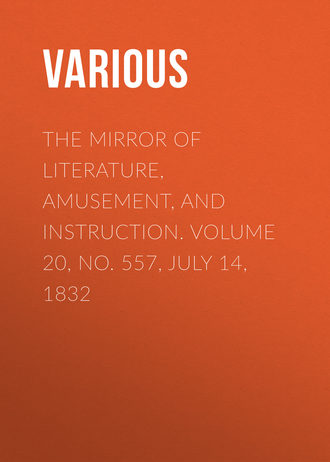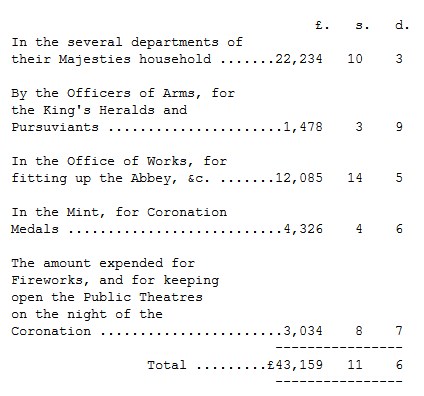 полная версия
полная версияThe Mirror of Literature, Amusement, and Instruction. Volume 20, No. 557, July 14, 1832
There is some help for all the defects of fortune; for if a man cannot attain to the length of his wishes, he may have his remedy by cutting of them shorter.—Cowley.
Fear sometimes adds wings to the heels, and sometimes nails them to the ground, and fetters them from moving.—Montaigne.
When I reflect, as I frequently do, upon the felicity I have enjoyed, I sometimes say to myself, that, were the offer made true, I would engage to run again, from beginning to end, the same career of life. All I would ask, should be the privilege of an author, to correct in a second edition, certain errors of the first.—Franklin's Life.
I do not call him a poet that writes for his own diversion, any more than that gentleman a fiddler who amuses himself with a violin.—Swift.
Pleasure of meat, drink, clothes, &c., are forbidden those that know not how to use them; just as nurses cry pah! when they see a knife in a child's hand; they will never say any thing to a man.—Selden.
There be that can pack the cards, and yet cannot play well: so there are some that are good in canvasses and factions, that are otherwise weak men.—Lord Bacon.
A poet hurts himself by writing prose; as a race-horse hurts his motions by condescending to draw in a team.—Shenstone.
I cannot imagine why we should be at the expense to furnish wit for succeeding ages, when the former have made no sort of provision for ours.—Swift.
Reserve is no more essentially connected with understanding, than a church organ with devotion, or wine with good nature.—Shenstone.
Those beings only are fit for solitude, who like nobody, are like nobody, and are liked by nobody.—Zimmerman.
Satire is a sort of glass, wherein beholders generally discover every body's face but their own;—which is the chief reason for that kind of reception it meets in the world, and that so very few are offended with it.—Swift.
Fools are very often united in the strictest intimacies, as the lighter kinds of woods are the most closely glued together.—Shenstone.
Old sciences are unravelled like old stockings, by beginning at the foot.—Swift.
If parliament were to consider the sporting with reputation of as much importance as sporting on manors, and pass an act for the preservation of fame, there are many would thank them for the bill.—Sheridan.
It is with wits as with razors, which are never so apt to cut those they are employed on, as when they have lost their edge.—Swift.
Exile is no evil: mathematicians tell us that the whole earth is but a point compared to the heavens. To change one's country then is little more than to remove from one street to another. Man is not a plant, rooted to a certain spot of earth: all soils and all climates are suited to him alike.—Plutarch.
Early Rising.—The celebrated John Wesley, who became by habit an early riser, says, "That the difference between rising at five and seven in the morning, for the space of forty years, supposing a man to go to bed every night at the same hour, is equivalent to an addition of ten years to his life."
Coronation Expenses of their present Majesties, William and Adelaide.

The Coronation of his late Majesty, George the Fourth, amounted to more than £268,000.
Narrow Escape.—Andrea Boscoli, the Italian painter, studied after nature; and in his travels he drew sketches of any particular objects that struck him. While pursuing this practice at Loretto, with regard to the fortifications of the city, he was seized by the officers of justice, and condemned to be hanged; but he happily escaped, within a few hours of execution, by the interposition of Signor Bandini, who explained to the chief magistrate his innocent intention.
P.T.W.
Women alias Angels.—Acidalius, the eminent grammarian and critic, whom Baillet reckons among his Enfans celebres, printed a small tract in 1595, intitled Mulieres non esse homines, or that "Women were not of the human species," which was falsely ascribed to him. He only accidently found the manuscript and printed it. It is said, that in order to appease the wrath of some ladies, who reproached him as the author, he declared his opinion, that the author was a judicious person, the ladies being certainly more of the species of angels than of men.
P.T.W.
1
The Mirror, it will be remembered, was the first work of its class that presented this economical attraction to the public: the Engravings throughout the Series number upwards of Eight Hundred.
2
In the Museum at Newcastle, are many of the identical specimens from which Bewick drew his figures for the wood-cuts of his zoological works.
3
See a paper on "the Life, Genius, and Personal Habits of Bewick," in the Magazine of Natural History, vol. iii.; by his friend, John F. Dovaston, Esq., A.M., of Westonfelton, near Shrewsbury. There is a vein of generous enthusiasm—a glow of friendship—a halo of the finest feelings of our nature—throughout and around this memoir, which has the sincerity and singleness of heart of—A FRIEND.
4
In Mr. Dovaston's paper is a misprint, which it may be as well to notice here. It is stated that Bewick cut the Old Exchange, at Newcastle, (the vignette of the above volume) in 1719.
5
Travels in the South of Spain. By William Jacob, Esq., M.P., F.R.S. 4to., 1811.









